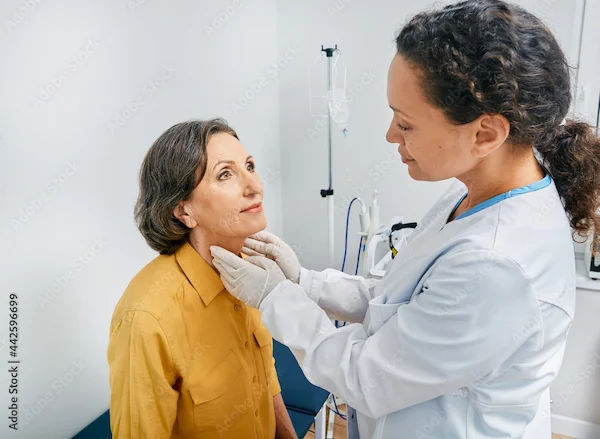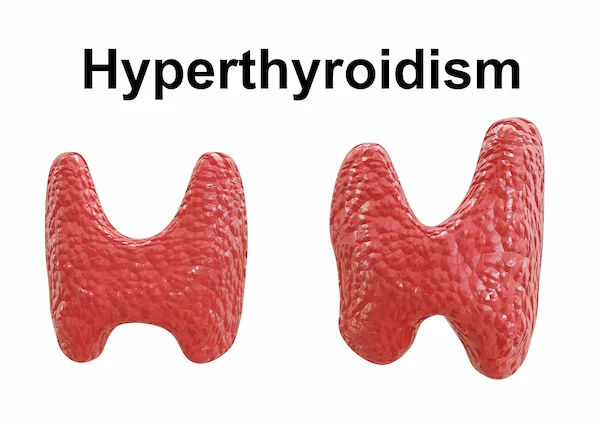Throat Thyroid Symptoms: How to Manage This Condition
Explore common throat thyroid symptoms, including swelling, hoarseness, and neck discomfort. Learn about their causes, diagnostic methods, and treatment options to effectively manage thyroid disorders.

Written by Dr Sonia Bhatt
Last updated on 3rd Jul, 2025
Situated at the base or front of the neck and beneath the larynx, the thyroid is an essential endocrine gland. It is responsible for producing thyroid hormones, which regulate most metabolic functions such as heart rate, weight, body temperature, and blood pressure, among others.
As a result, any dysfunction in the gland can lead to a range of complications associated with throat, neck and other health issues. Prompt medical intervention to manage an overactive or underactive thyroid is essential to maintain overall physical and mental health.
This article covers the symptoms of thyroid disorders and how physicians manage thyroid disorders by recognising them, undergoing tests, prescribing medications and suggesting lifestyle changes.
Overview of the Thyroid Gland and Thyroid Disorders
The functioning of the thyroid gland is regulated by the hypothalamus and pituitary gland located in the human brain. Thus, any kind of disorder tends to affect the gland, causing thyroid disorders.
The thyroid gland produces and releases two key hormones, namely thyroxine (T4) and triiodothyronine (T3), to manage metabolism and energy production in the human body. Hormonal misbalance of the thyroid gland leads to multiple thyroid disorders like Graves' disease, Hashimoto’s thyroiditis or even thyroid cancer.
An individual with thyroid disorder can experience a variety of symptoms, including palpitation, fatigue, aching, difficulty focusing, etc.
Types of Thyroid Disorders and Their Symptoms
There are various factors, such as iron deficiency, autoimmune diseases, lifestyle, exposure to radiation, etc., that inhibit the thyroid gland to produce the desired level of hormone. Consequently, the impairment of the gland can result in a range of thyroid disorders and symptoms, as stated:
1.Hyperthyroidism: It refers to a condition when the thyroid gland becomes overactive and starts producing too much thyroid hormone, breaking hormonal balance.
- Symptoms: Nervousness, inability to tolerate heat, heart palpitation, and weight loss even after eating the same amount of food.
2.Hypothyroidism: This condition develops when the thyroid gland becomes underactive and starts releasing a lesser amount of thyroid hormone than needed, causing an imbalance of thyroid hormone.
- Symptoms: Mild to extreme tiredness, inability to withstand the cold, dry skin, depression, difficulty in concentration, weight gain, etc.
3.Thyroiditis: Thyroiditis refers to inflammation of the thyroid gland and can be caused by both under or overactive thyroid.
- Symptoms: Mild to high fever, pain in the neck, fatigue, etc.
4.Thyroid Nodules: Thyroid nodules can form either fluid-filled or solid lumps within the thyroid.
- Symptoms: Swallowing or breathing difficulty due to the lumps.
5.Goitre: A goitre refers to unusual growth of the thyroid gland and can be caused by hyperthyroidism or hypothyroidism. Usually, goitres do not cause pain as experienced in thyroiditis.
- Symptoms: A feeling that something is stuck in the throat, scratchy voice, hoarseness, swelling of neck veins, coughing, difficulty swallowing as the bulge strains the oesophagus or trachea, constipation
6.Thyroid Cancer: Although rare, thyroid cancer can form as a lump at the neck's front and below the Adam's apple.
- Symptoms: Aching, difficulty swallowing or food or breathing, fever, vomiting, nausea, and unexpected weight loss.
Consult Top Doctors For Thyroid Symptoms
Risk Factors of Thyroid Disorders
Following are the major risk factors that can cause various thyroid disorders:
- Individuals with AFAB (assigned female at birth) are five to eight times more likely to experience thyroid issues compared to those assigned male at birth (AMAB).
- People who have Turner syndrome.
- Those who have a family history of thyroid disorders (including thyroidectomy or radiation treatment).
- People over the age of 60, particularly if they are AFAB (assigned female at birth).
- Individuals residing in a region without iodised table salt can result in iodine deficiency.
- Those who have undergone radiation therapy to the head or neck.
- Individuals who have autoimmune disease.
Diagnosis of Thyroid Disorders
A doctor will perform some thyroid examinations in order to confirm a diagnosis. These include:
Physical Examination
First of all, the healthcare provider performs a physical examination to inspect visible primary signs of a thyroid disorder. The procedure may involve an examination of the neck near the gland area to notice if any regular swelling is formed.
This can indicate either a thyroid nodule or a goitre. Sometimes, doctors also consider checking alterations in the skin texture, hair, or other physical symptoms indicating thyroid dysfunction. During this phase, doctors ask the patient about issues that they experience and their medical history.
Blood Tests
Following the physical examination, the doctor may prescribe blood tests to make sure the patient has a thyroid disorder. If the person has a thyroid problem, the doctor will check whether it is hypothyroidism, hyperthyroidism, or a cancerous problem. The treatment methods, like medications, usually vary based on the type of thyroid issue.
Generally, some of the common blood tests include TSH (thyroid-stimulating hormone), which measures the activity level of the thyroid gland. A high level of TSH indicates hyperthyroidism, while a lower level exhibits hypothyroidism disorder. Another test is the T3 (triiodothyronine), which measures the triiodothyronine level. Lastly, the T4 (thyroxine) test measures the thyroxine level.
Antibody Test
The antibody test helps detect autoimmune conditions such as Graves' disease or Hashimoto's disease. This test measures the level of thyroid antibodies in blood. Various types of thyroid antibody tests involve tests for thyroglobulin antibodies (TgAb), thyroid peroxidase antibodies (TPOAb), thyrotropin receptor antibodies (TRAb), and thyroglobulin (TG).
Imaging Tests
Imaging tests, such as a thyroid ultrasound, enable the doctor to check for lumps or a goitre. Nuclear medicine imaging, including a thyroid uptake and scan, can reveal if the nodules are overactive.
Get Your Thyroid Symptoms Checked
Treatments for Thyroid Disorders
Treatment for thyroid conditions varies based on the specific condition and its cause. For hyperthyroidism, treatment options include:
- Medications: Antithyroid medications like Methimazole and Propylthiouracil prevent the thyroid from producing hormones.
- Radioiodine Therapy: This treatment method damages thyroid cells, preventing them from producing excess thyroid hormones.
- Beta-blockers: Beta-blockers can control symptoms related to thyroid disorders, such as a fast heartbeat.
- Surgery: For hypothyroidism, the primary treatment is thyroid replacement therapy. This involves taking synthetic hormones to restore what the body lacks, with levothyroxine being a popular option prescribed by doctors.
Lifestyle Changes and Home Remedies to Manage Thyroid Disorders
Although medications are necessary, certain lifestyle changes can also help manage thyroid disorders. These home-based remedial measures include:
Eat a Balanced Diet
People should consume protein-rich foods like fish, lean meats, and nuts and focus on healthy fats. Avoid stimulants like caffeine to reduce anxiety, palpitations, and insomnia. Besides, taking adequate calcium and vitamin D for bone health can be effective, as hyperthyroidism can lead to osteoporosis.
Exercise Regularly
Individuals can engage in moderate, low-impact exercises such as walking, jogging, swimming, or yoga to help manage weight loss and muscle weakness associated with hyperthyroidism.
Improve Sleep and Manage Stress
Practising good sleep by maintaining regular sleep schedules in a quiet and peaceful environment can keep the thyroid in control. Also, using relaxation techniques like deep breathing and meditation can reduce stress and anxiety.
Undergo Health Check-up Periodically
Visiting the doctor to monitor thyroid function, adjusting medications, and tracking the effectiveness of treatments is essential.
Conclusion
Health complications like neck swelling, trouble swallowing, hoarseness, a persistent cough, or neck pain must not be overlooked. This is because it might be a sign of thyroid issues that can cause conditions such as goitre, thyroid nodules, hypothyroidism, or hyperthyroidism. Often, it may also represent thyroid cancer.
Hence, getting medical attention at an early stage is a must since it can prevent further health complications. Besides, changing lifestyle habits and diet can help maintain thyroid health properly.Consult Top Endocrinologist
Consult Top Doctors For Thyroid Symptoms

Dr Venkata Naga Sai Tribhushan Rambhatla
General Physician
3 Years • MBBS
Bengaluru
PRESTIGE SHANTHINIKETAN - SOCIETY CLINIC, Bengaluru

Dr. Anand Ravi
General Physician
2 Years • MBBS
Bengaluru
PRESTIGE SHANTHINIKETAN - SOCIETY CLINIC, Bengaluru
Dr Sumanth R
General Physician
2 Years • MBBS
Bengaluru
PRESTIGE SHANTHINIKETAN - SOCIETY CLINIC, Bengaluru

Dr. Mary Susan K S
General Physician/ Internal Medicine Specialist
13 Years • MBBS, MD INTERNAL MEDICINE
Bengaluru
Apollo Clinic, Sarjapur Road, Bengaluru

Dr. Nithin Reddy Modhugu
Endocrinologist
6 Years • MBBS, MD (General Medicine), DNB (Endocrinology)
Hyderabad
Dr. Nithin's Endocrine Clinic, Hyderabad
(100+ Patients)
Get Your Thyroid Symptoms Checked
₹620(₹1550)60% off
₹536(₹1341)60% off
₹2364(₹5910)60% off
₹2472(₹6179)60% off
₹2999(₹7498)60% off
₹1550(₹3875)60% off
₹3099(₹7748)60% off
Consult Top Endocrinologist

Dr Venkata Naga Sai Tribhushan Rambhatla
General Physician
3 Years • MBBS
Bengaluru
PRESTIGE SHANTHINIKETAN - SOCIETY CLINIC, Bengaluru

Dr. Anand Ravi
General Physician
2 Years • MBBS
Bengaluru
PRESTIGE SHANTHINIKETAN - SOCIETY CLINIC, Bengaluru
Dr Sumanth R
General Physician
2 Years • MBBS
Bengaluru
PRESTIGE SHANTHINIKETAN - SOCIETY CLINIC, Bengaluru

Dr. Mary Susan K S
General Physician/ Internal Medicine Specialist
13 Years • MBBS, MD INTERNAL MEDICINE
Bengaluru
Apollo Clinic, Sarjapur Road, Bengaluru

Dr. Nithin Reddy Modhugu
Endocrinologist
6 Years • MBBS, MD (General Medicine), DNB (Endocrinology)
Hyderabad
Dr. Nithin's Endocrine Clinic, Hyderabad
(100+ Patients)





